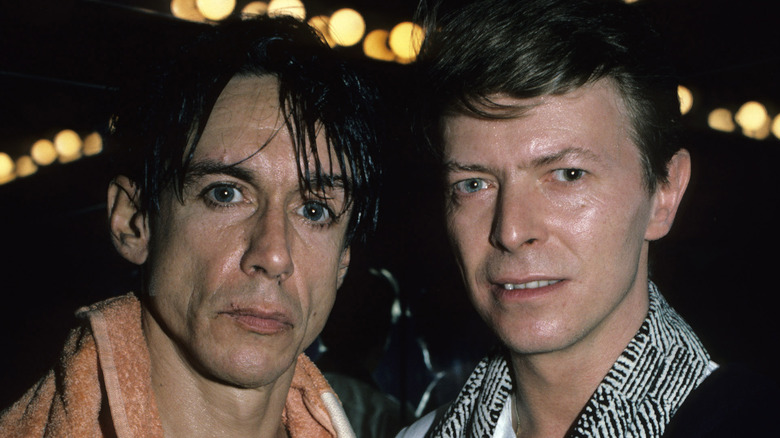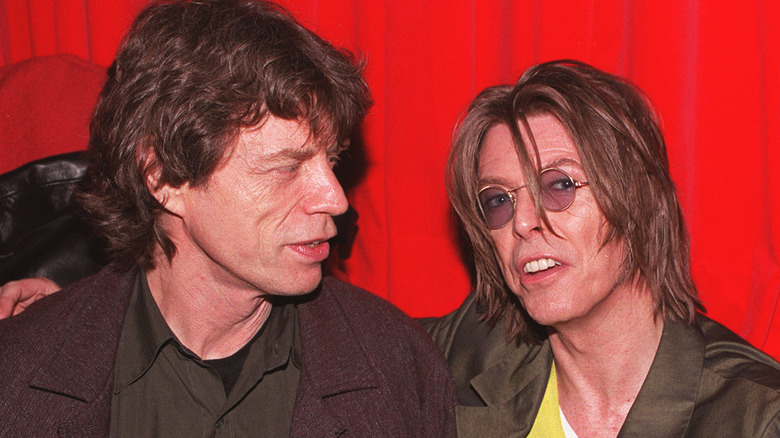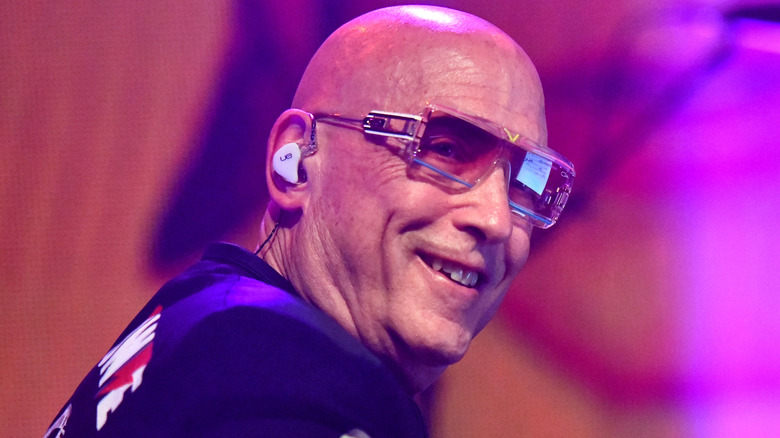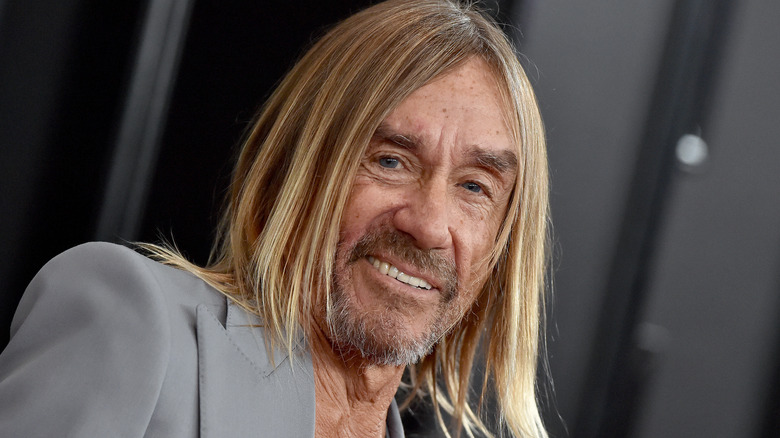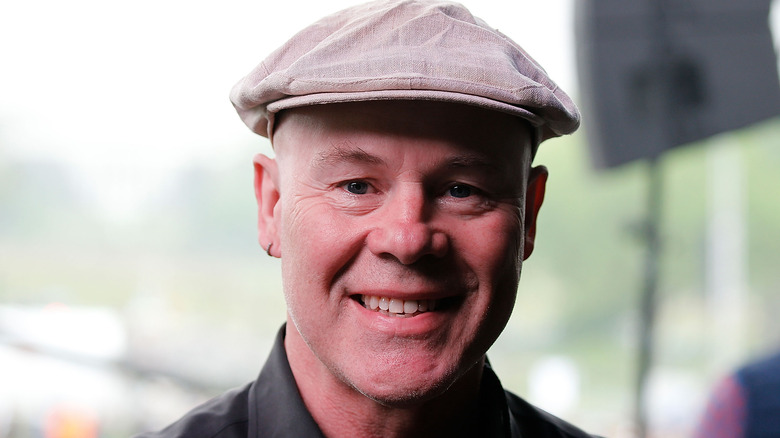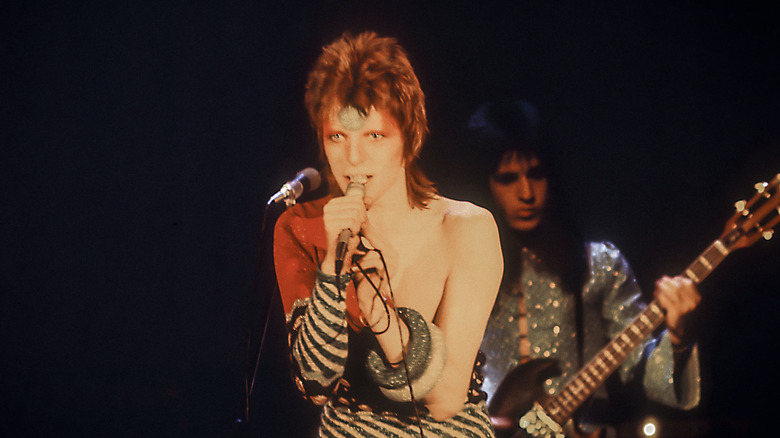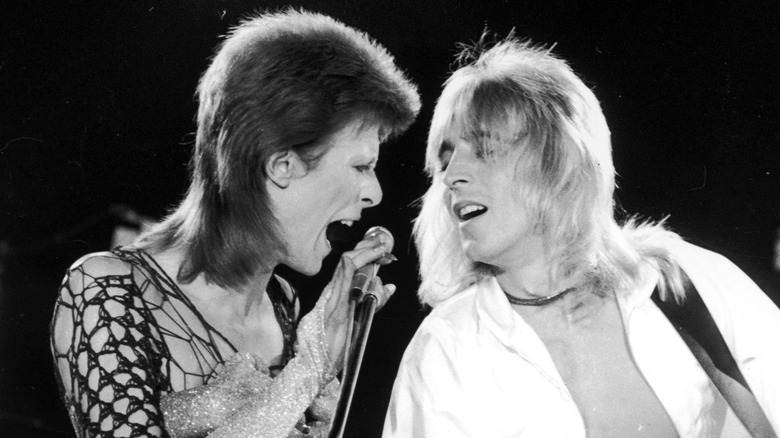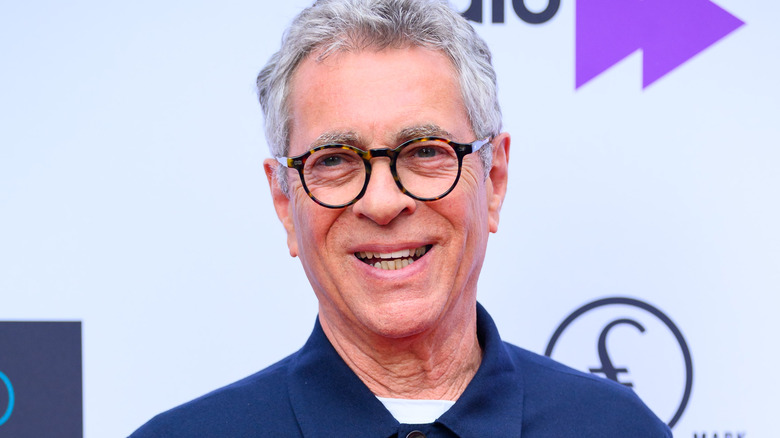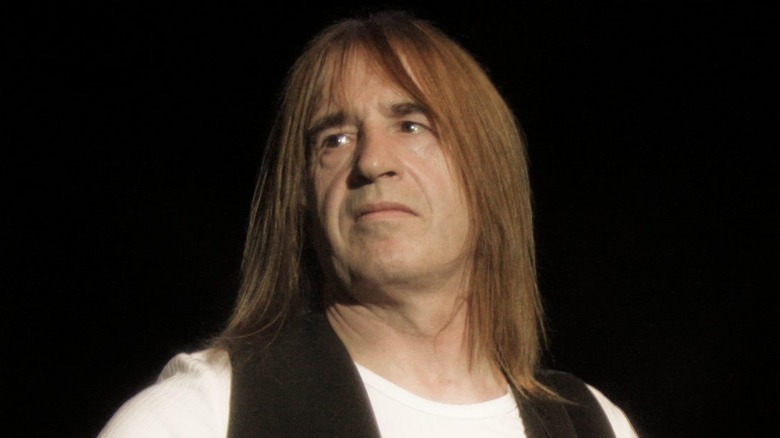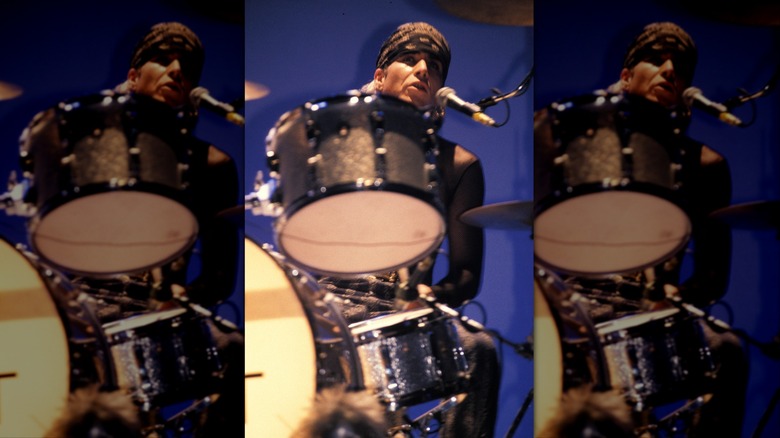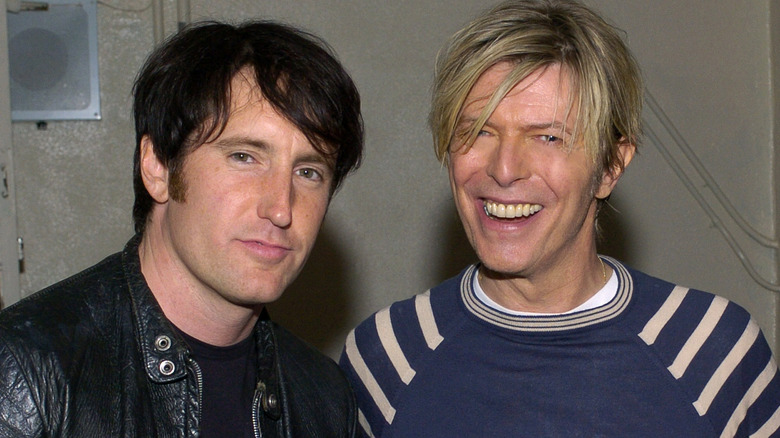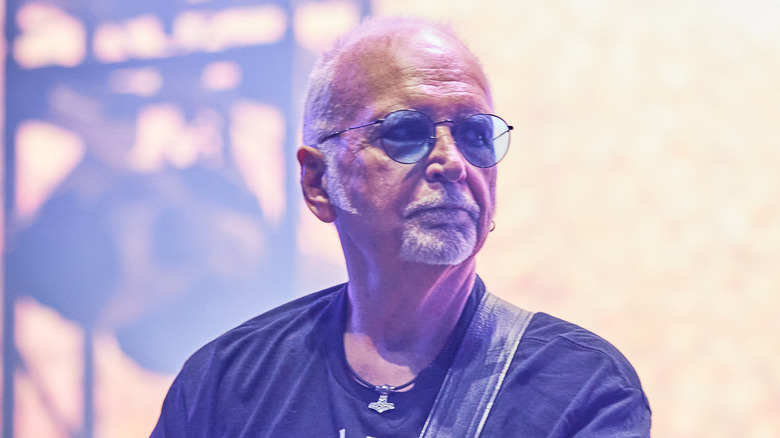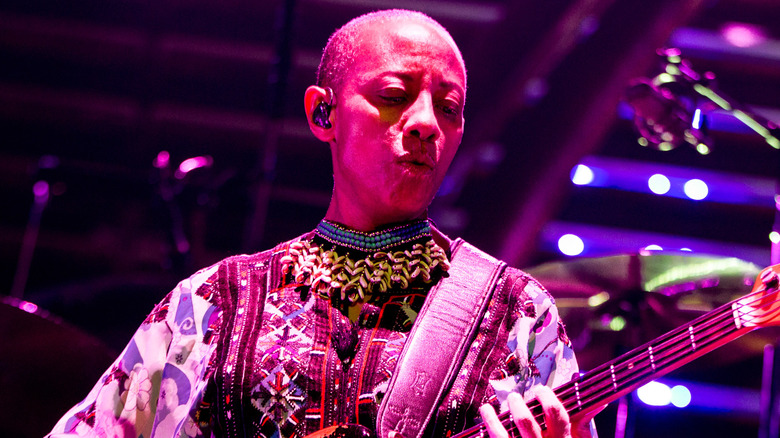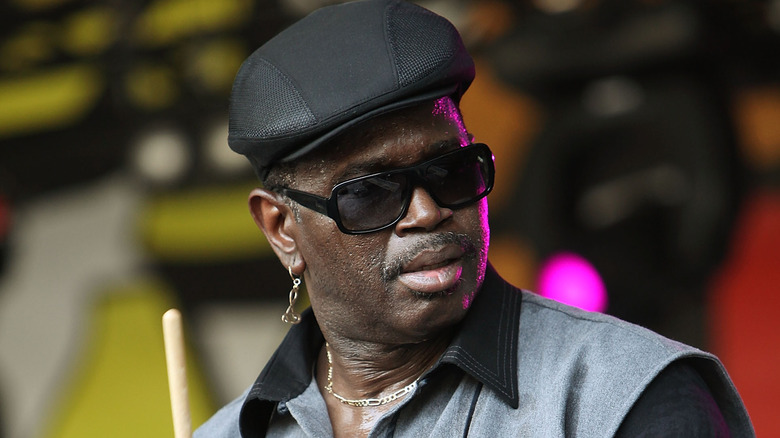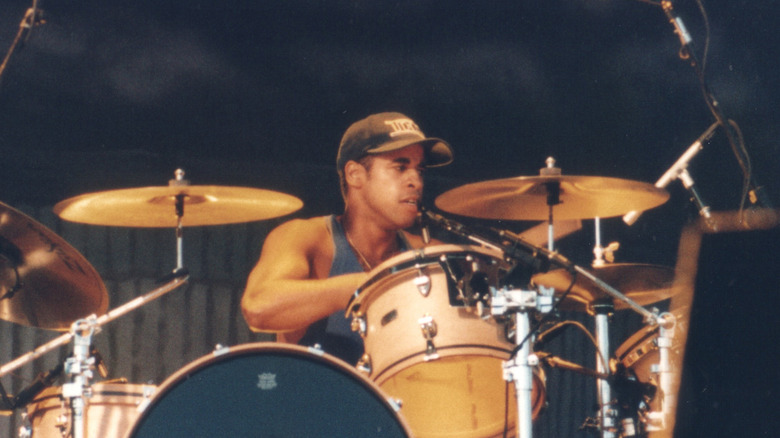What David Bowie's Former Bandmates Said About Him
As famous as he was — and for many decades at that — it seems like the world never really knew the "real" David Bowie. Perhaps it's because he so frequently presented himself in the guise of a character. While his music spoke to relatable concerns and the state of the human condition, Bowie cycled through all-consuming personas like "The Thin White Duke" and "Ziggy Stardust" and just as frequently changed his musical style to keep up with trends and to create new ones.
But along with genius-level abilities for music, art, and curation came bewilderment and unpredictability. Because the world never knew what Bowie was going to do next, he stayed inscrutable, and admirers forever wanted to try to understand him and his motivations. Long before and long after his unexpected death in 2016, music biographers and reporters have questioned Bowie's closest, most trusted, and most prolific collaborators in search of information and anecdotes. Fans just want to know what Bowie was like offstage, without the makeup, and outside of the pursuit of art. Here then is a character sketch of the actual David Bowie, as drawn by the words of those who knew him best — the musicians with whom he most frequently worked.
Mick Jagger
Both classic rock icons who dominated music in the 1970s, David Bowie and Mick Jagger of the Rolling Stones collaborated on record just once. In 1985, they recorded a one-off cover version of the Martha and the Vandellas 1964 hit "Dancing in the Street." The Bowie and Jagger version reached No. 1 in their native U.K. and the Top 10 in the U.S. The two were friends for many years both before and after "Dancing in the Street," and according to Bowie's wife, Angela, they were also discrete lovers at one point.
After Bowie's death in 2016, Jagger talked up their close friendship to Rolling Stone. "There was always an exchange of information within our friendship. And I suppose there was always an element of competition between us, but it never felt overwhelming," Jagger said, adding that they most often discussed the work concerns unique to rock stars, like hiring band members, songwriting methods, and flashy fashion. "He'd always look at my clothes labels. When he would see me, he'd give me a hug, and I could feel him going up behind the collar of my shirt to see what I was wearing. He used to copy me sometimes, but he'd be very honest about it," he said. "I didn't mind sharing things with him, because he would share so much with me — it was a two-way street."
Mike Garson
Jazz musician Mike Garson joined the David Bowie universe early in the latter's career, successfully auditioning to play keyboards (and piano, organ, and harpsichord) in Bowie's live band even though he wasn't familiar with Bowie's music. With 600 shows logged between 1972 and 2006, nobody played alongside Bowie more than Garson did. Garson's multi-instrumental work is also all over many Bowie albums, such as "Aladdin Sane," "Pin Ups," "Diamond Dogs," "Young Americans," "Black Tie White Noise," and "Earthling."
Garson thus witnessed Bowie's rise to stardom and every era that followed, and he knew from the beginning that there was an icon in the making. "He was beautifully sculpted — his face, the makeup, the clothing. You knew you were in the presence of a star. The only other person I'd seen like that was Elvis Presley," Garson told Classic Rock, also remarking that musically, Bowie was "egoless." "He was so open to ideas. He didn't consider me some hired piano player, he considered me part of his creations."
The keyboardist marveled at Bowie's work and leadership styles, too. "He always had a vision, but he never micromanaged," Garson told Quartz. "In that sense he was like Miles Davis: He knew who to pick to work with, and he knew if he got out of the way and let them do their thing, he'd get the most out of them."
Iggy Pop
After fronting the proto-punk band the Stooges, Iggy Pop launched a solo career with two albums in 1977, "The Idiot" and "Lust for Life." David Bowie, Pop's friend and mentor since 1971, engineered this second act, producing both records, co-writing songs, and assembling a band of backing musicians. On the second LP, Bowie played piano, too. Pop deeply appreciated all of it.
"He was more of a benefactor than a friend in a way most people think of friendship. He went a bit out of his way to bestow some good karma on me," Pop told The New York Times, going on to talk about how Bowie showed genuine interest in Pop's family in Michigan. "He came to my parents' trailer," Pop explained. "My father's a very wonderful man, and he said, 'Thank you for what you're doing for my son.' I thought: Shut up, Dad. You're making me look uncool." Upon Bowie's death in 2016, Pop memorialized the musician on X, then known as Twitter. "David's friendship was the light of my life. I never met such a brilliant person. He was the best there is," Pop tweeted.
Thomas Dolby
Thomas Dolby had one big hit in the U.S. — the 1982 synth-powered "She Blinded Me with Science." He was also an electronic music pioneer with an extensive resume as a session musician, and it was in this capacity that Dolby joined David Bowie's band as a keyboardist for the singer's 1985 Live Aid performance. Bowie wasn't completely aware that the outdoor music festival was staged to raise money to fight famine in Africa. "Bowie himself, a week before the concert, didn't really get what it was still," Dolby told Ultimate Classic Rock. "He thought he was doing a big gig to promote his current single. And then ... he realized it wasn't about that. He was going to rise above that and do something transcendent, and so he kept changing the choice of songs right up until the last minute."
That rushed atmosphere nevertheless gave Dolby a strong impression of how Bowie made art. "He really thrives on inspiring the musicians around him to bring out something of themselves, and then he's almost like a conductor in the middle of the room. He'd never grab a guitar from you and show you a chord or plunk out a melody on the keyboard. He would just stand in the middle of the room exuding light, and we all wanted to shine for him. It's a very inspiring experience."
Nicky Graham
In 1972 and 1973, David Bowie embarked on a world tour in support of his 1972 concept album "The Rise and Fall of Ziggy Stardust and the Spiders from Mars." Bowie (pictured) adopted the persona of an extraterrestrial rock star, backed by the Spiders from Mars. Among the side musicians hired to portray the Spiders from Mars at all those concerts was keyboardist Nicky Graham.
It was during this time that Bowie's fame and influence exploded, and a bemused Graham took note of how it personally affected the newly minted rock star. "It was a brilliant tour to be on, although we never imagined David to be a major star. He was just the singer in the band. He would eat with us. He would be in the bar afterwards with us, and he would travel with us," Graham told Billboard in 2016 of Bowie's modesty and egalitarian nature. "He didn't go in a limo while the Spiders went in a bus. We were all in it together. I think David was probably more shocked than anyone about how successful it was becoming."
Mick Ronson
Mick Ronson created the idea of David Bowie more than anyone else besides Bowie himself. A writer and arranger of songs, a live and studio guitarist, and a producer, Ronson played on Bowie's breakout single, the 1969 sci-fi-folk hybrid "Space Oddity," and he stuck around through Bowie's early years of stardom and experimentation. Ronson arranged songs on "Hunky Dory," played guitar as one of the Spiders from Mars (supporting Bowie's Ziggy Stardust character), and after a hiatus of more than 15 years — Bowie fired him in the mid-1970s — he worked on the 1993 LP "Black Tie White Noise" shortly before his death from cancer.
The relationship between the two musicians declined at one point, and Ronson explained when and how it happened. "I remember the Ziggy tour, he was so happy then. He loved it and we were all having the time of our lives. And it got knocked on the head. It was such a f***ing shame," Ronson told reporter Garry Mulholland (via Uncut) in 1975. "America affected the band so badly. I'm going to be over there in two weeks, and I'm going to see Dave as soon as I get there. I'm going to get hold of him and smack him across the head, right across the earhole, and try to drum a bit of sense into him. I wish he could be here, in this room, right now so I could kick some sense into him."
Warren Peace
David Jones knew Geoff MacCormack for most of his life, as the two met at school when they were 8 years old. They'd both become professional rock musicians, and both under stage names — David Bowie and Warren Peace, respectively. In the 1970s, MacCormack acted as a backup singer on five Bowie LPs, including "Aladdin Sane" and "Station to Station," and he was part of the traveling ensemble in the 1974 tour in support of "Diamond Dogs," an album that contains a song he co-wrote, "Rock 'n' Roll With Me."
In 2023, MacCormack looked back on a lifetime of memories to reflect on the big-picture meaning and impact of Bowie. "I think, like any huge artist who's had that longevity and that array of work, I think he's pretty well cemented himself a place in music history. Because there's something — even if you're not a fan of everything he did — there's something admirable about the way he got through that and reinvented himself so many times and kept you guessing that other artists just don't have," MacCormack told Ultimate Classic Rock. "You think of a band or an artist, you kind of think of that genre, whereas it's difficult to stick that on him and go, 'Which genre? When he did that? Or when he did that?' So it's that force of a body of work, rather than a style. So I think on that basis, he'll always be huge. Hugely respected."
Trevor Bolder
The first David Bowie project for bassist and occasional trumpet player Trevor Bolder was the 1971 album "Hunky Dory." He'd become a member of Bowie's "Ziggy Stardust"-era band, playing live and contributing to "Aladdin Sane," "Pin Ups," and "The Rise and Fall of Ziggy Stardust and the Spiders from Mars." When Bowie moved on from the alien persona and that band, Bolder joined the popular British hard rock outfit Uriah Heep.
As a firsthand witness to the rise of Bowie into the realm of superstardom, for better or for worse, Bolder (who died in 2013) harbored complicated, mostly negative feelings about his former boss. "A mixture of good memories and really bad memories. Really bad memories towards the end, when he changed as a person. He was really until then, just a regular sort of folk, he was a nice, caring bloke, but the bigger he got, the bigger his head got, and the less important you were to him," Bolder told rock reporter Dmitry M. Epstein in 2003. "From ... the stories I've heard, with all the musicians that were with him, he tread that line: When he didn't need you, he'd discard you, but while he needed you, he was very friendly towards you, but as soon as he'd used you for what he wanted, then he wouldn't go around your door, never to be seen or talked to again."
Hunt Sales
After many distinct eras as a solo musician with various groups of hired backing musicians, David Bowie set out to form a true rock band in the 1980s. That idea became the two-album project Tin Machine, and drummer Hunt Sales was among those Bowie recruited. Long associated with Todd Rundgren, Sales previously backed up Iggy Pop in the late 1970s, when Bowie briefly played keyboards in the same band.
Sales seemingly didn't feel much if any intimidation around Bowie, always viewing him as a bandmate and compatriot. "Tin Machine was a band; I didn't work for him, I worked with him," Sales told Billboard in 2018. "I could say, 'Y'know what I like about that idea, Dave?' He'd say 'What?' and I'd go, 'Nothing!' and he'd laugh 'cause at least I was shooting from the hip and being honest with him. For once he had some people who weren't kissing his a**."
Trent Reznor
In 1995, David Bowie toured to promote his "Outside" album, bringing along Nine Inch Nails, founded and fronted by Trent Reznor. Bowie and Reznor often took the stage together and on record, Reznor produced multiple Bowie remixes, including five new takes on "I'm Afraid of Americans," and also starring in that song's music video.
Being asked to play with Bowie was monumental for Reznor, who once saw the musician as an idol and later as a guide and fatherly presence. "To actually meet this man in the flesh and find out, to my delight, that he passed any expectation I had. The fact that he was this graceful, charming, happy, fearless character became a new point of inspiration for me," Reznor told Rolling Stone. "One of the greatest moments of my life was standing on stage next to David Bowie while he sang 'Hurt' with me. I was outside of myself." Reznor also credits Bowie for helping him beat an addiction to drugs. "When I met David, he had been through that. And he was content. He was at peace with himself, with an incredible wife, clearly in love. There were a number of times where the two of us were alone, and he said some things that weren't scolding, but pieces of wisdom that stuck with me: 'You know, there is a better way here, and it doesn't have to end in despair or in death.'"
Reeves Gabrels
David Bowie formed an experimental hard rock band called Tin Machine in the late 1980s, populating the group with previous collaborators Hunt and Tony Fox Sales along with new cohort Reeves Gabrels. Sticking with Bowie through two Tin Machine albums and most every solo project of his throughout the 1990s and beyond, Gabrels served as Bowie's lead guitarist longer than anyone else.
Their relationship evolved over time, but Gabrels frequently acted as Bowie's confidante when discussing the less-than-attractive elements of being a celebrity and public-facing artist. "In the early days, David had a very older-brother thing with me. The music thing was the easy part. I understood that. And even hostile press," Gabrels told Premier Guitar. "But David said to me early on when we were in the studio, during what became Tin Machine but before the Sales brothers were involved, 'It's great when we're behind these walls, but as soon as we get out in the world and start dealing with the paparazzi side of press and things like that, it's gonna get weird. It's like, basically, we're all equals in here, but as soon as we get outside, it's gonna be all about me.'" Gabrels also said that Bowie bluntly lamented that all fame could really get him were "'a good table in a restaurant so I'm not near the kitchen'" and "'free tickets to shows.'"
Gail-Ann Dorsey
In 1994, David Bowie personally called bassist Gail Ann Dorsey — a solo artist and prolific session musician who has played with alternative rock bands like Tears for Fears, Indigo Girls, and Gang of Four — to offer her a spot in his band. Dorsey accepted the gig, and she remained a member of Bowie's live ensemble until 2002, also appearing on the album "Earthling."
"Bowie was smart... really smart," Dorsey wrote in a piece for The Guardian memorializing the rock star after his 2016 death. "For someone who had allegedly done so many drugs, the wealth of intellect he possessed and exuded was astonishing. He used to tell me he was thankful I didn't know him when he was on drugs, that I wouldn't have liked him very much."
Bowie left Dorsey feeling loved and respected. "David was positive and energizing. He was kind, and generous in the things that truly mattered, like knowledge, humor, respect and, of course, art in all its forms," she added. "With me, he graciously and buoyantly shared his stage for many years, and at times when the stage was mine alone, he would venture out to watch me perform a solo acoustic set at some Manhattan singer-songwriter cave on a weeknight, lurking there in the shadows, cheering me on."
Dennis Davis
Dennis Davis trained as a jazz drummer and played professionally with a big band in the 1960s, and then while fighting in the Vietnam War, joined the U.S. Navy's Drum and Bugle Corps. He offered exactly the sound that David Bowie wanted for his soul-influenced 1975 album "Young Americans," and Davis became Bowie's go-to drummer for the rest of the 1970s, playing on "Station to Station" (and its concert tour) and all three entries in the Germany-recorded "Berlin trilogy" ("Low," "Heroes," and "Lodger") as well as the Bowie-produced Iggy Pop LP "The Idiot."
In 1978, Davis told Sound International (via mu:zines) that he was impressed with Bowie's ability to merge seemingly disparate musical genres and create something out of happenstance. "That's David Bowie for you. Somethin' from over here, add it in there," Davis said. "I saw him write a song one day. He wrote out a paragraph of words. He cut them all up, put'm in a paper bag, shook'm up. He tipped them out of the bag on to the table, stuck all the words back together in the order that they came out of the bag and there was a song! Really freaked me out, but it worked."
Sterling Campbell
Following tenures with Duran Duran and Soul Asylum, drummer Sterling Campbell contributed to David Bowie's 1995 industrial rock album "Outside," and then returned in 1999 for the "Hours" album. From that point on, Campbell served as Bowie's preferred percussionist on record and on tour, backing up the rock star up until his final projects before his death in 2016. Through it all, Campbell was constantly in awe of Bowie. "Having him in my life was an incredible experience. I got to have meaningful conversations with him," Campbell told Rolling Stone. "And I'm helping him create this stuff, and having a laugh with him on top of it. He was so gracious. At the time I came into his life, he was everything you'd want it to be if you met your hero."
Campbell also says that the deep talks with Bowie continued even after the latter died. When he was bombarded with media requests to reflect on their relationship, Campbell wrote to Bowie, in search of advice from beyond the grave. He claims Bowie answered him. "He said to me, 'As long as you don't speak about my personal life, you can say whatever you like. I've said what I have to say.' I was like, 'I'm not going to talk for you!' But I just loved that, too. It was like, 'I said what I had to say. Listen to the work. Listen to the words. I said it.'"
